Key takeaways:
- Water conservation is crucial in organic wine production, utilizing practices like drip irrigation, mulching, and rainwater harvesting to enhance soil health and reduce water waste.
- Effective irrigation directly impacts crop health and grape quality, with careful management determining flavor profiles and overall vineyard performance.
- Organic wine production relies on sustainable practices, biodiversity, and avoiding synthetic chemicals to create healthy ecosystems and high-quality products.
- Technological advancements, such as soil moisture sensors, can significantly improve water management and conservation efforts in vineyards.
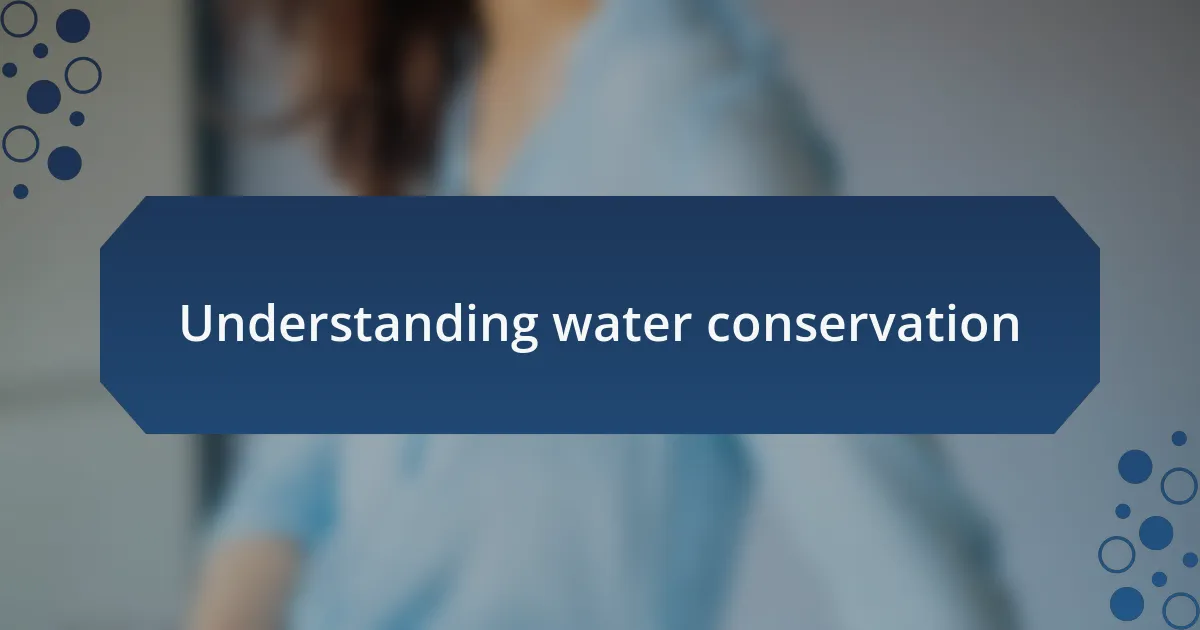
Understanding water conservation
Water conservation is essential in all forms of agriculture, particularly in organic wine production where maintaining soil health is paramount. I remember standing in my vineyard during a scorching summer, realizing just how precious every drop of water is. It led me to ponder, what if our approaches to irrigation could mimic nature’s wisdom, conserving water while enriching the soil?
Understanding the nuances of water conservation involves recognizing that the right practices can significantly reduce waste and enhance crop resilience. For instance, I’ve experimented with drip irrigation systems, which deliver water directly to the roots. This method not only minimizes evaporation but also allows me to nurture my vines more effectively, reminding me that sometimes a little innovation goes a long way.
Have you ever thought about how much water we take for granted? I used to overlook how our practices can lead to substantial water savings. By adopting mulch and cover crops in my vineyard, I’ve witnessed firsthand how these techniques enrich the soil while reducing the need for excessive watering—an experience that deepened my appreciation for sustainable farming.
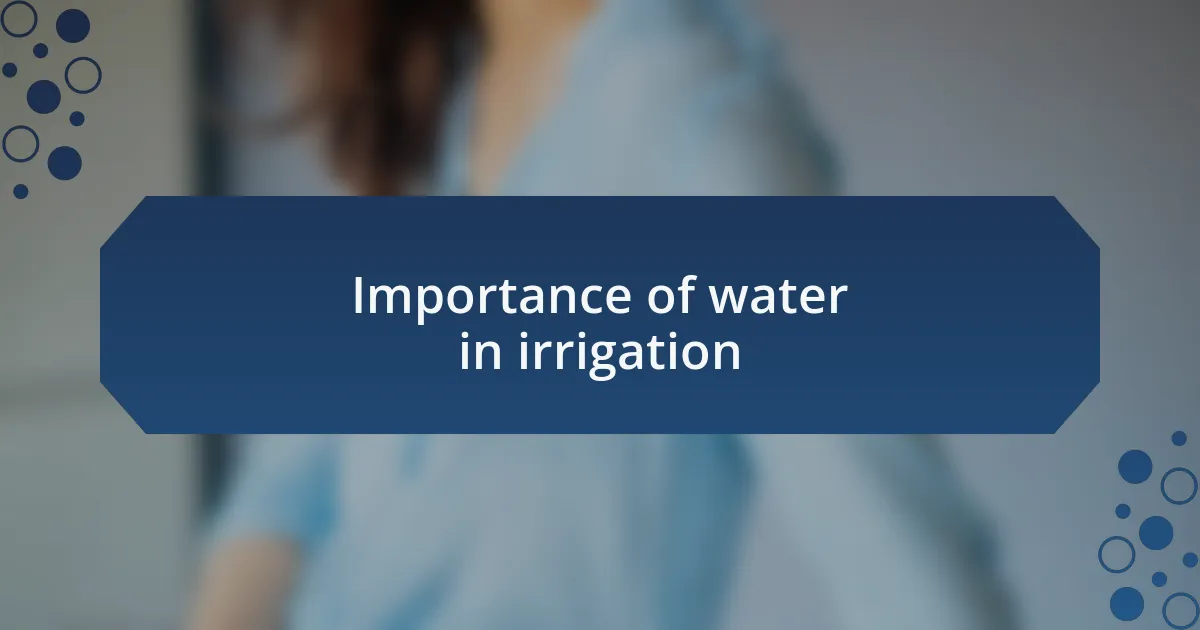
Importance of water in irrigation
Water is the lifeblood of any agricultural endeavor, particularly in the world of organic wine production. When I walked through my vineyard after a well-timed rain, I couldn’t help but notice how vibrant the vines looked, their leaves glistening with moisture. It reaffirmed my belief that proper irrigation can dramatically influence not only the health of the plants but also the quality of the grapes. Have you ever seen how vines thirst for water during dry spells? It truly struck me how essential it is to have a reliable water source for nurturing their growth.
Effective irrigation is crucial because it supports root development and promotes nutrient uptake. I remember a summer when I neglected to adjust my irrigation schedule. The stress on the vines was evident—the leaves curled, and the grapes were smaller and less flavorful. This experience taught me that without adequate water, even the best soil can’t deliver optimal results. It’s fascinating to think about how water management can directly affect the flavor profile of the wine we produce.
Moreover, the role of water goes beyond mere sustenance; it interplays with environmental health. When I adopted rainwater harvesting techniques in my vineyard, not only did I reduce my dependency on external water sources, but I also contributed to soil moisture retention. Have you considered the ripple effects that efficient water use can have on the entire ecosystem? It’s exhilarating to realize that with thoughtful irrigation practices, we can create a flourishing environment for our vines while simultaneously safeguarding precious water resources.
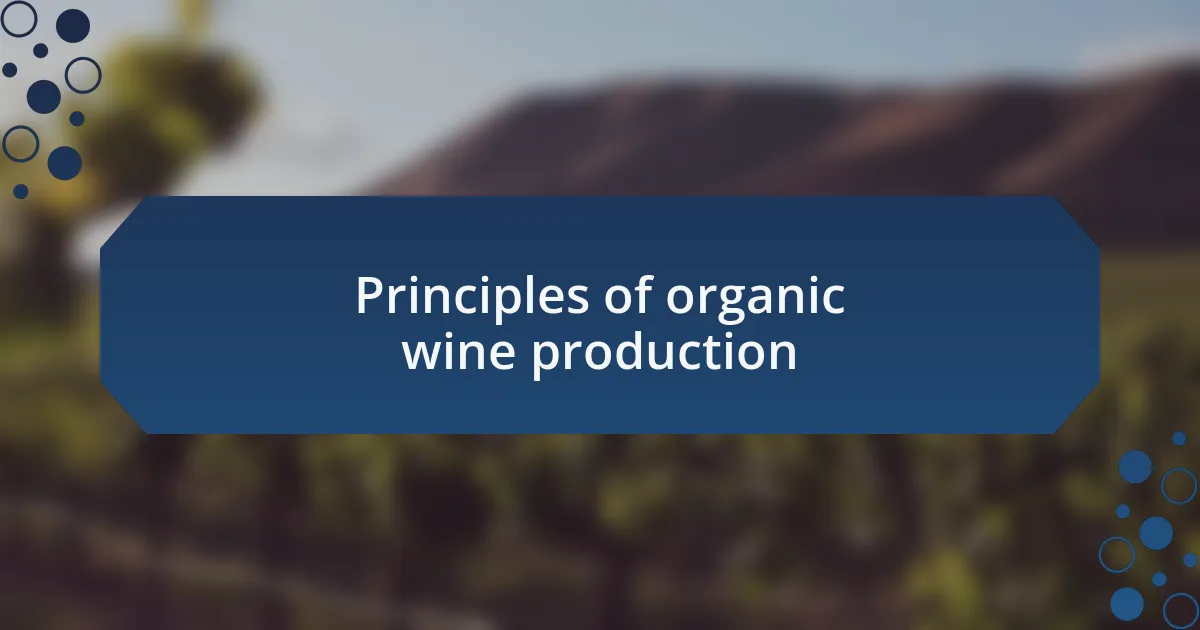
Principles of organic wine production
Organic wine production revolves around the fundamental principles of sustainability and biodiversity. When I first started my vineyard, I was surprised by how embracing natural processes could enhance grape quality. The use of organic methods, such as planting cover crops, not only prevents erosion but also enriches the soil with essential nutrients, allowing the vines to flourish naturally. Have you ever considered how a diverse ecosystem can bolster a vineyard’s resilience against pests?
Another critical principle is the avoidance of synthetic chemicals, which can disrupt the delicate balance of the vineyard ecosystem. One memorable year, I experimented with natural pest repellents derived from essential oils. It was remarkable to witness fewer pests while still preserving the health of my plants. This hands-on experience reinforced my understanding that organic practices not only ensure a healthier product but also help maintain the vineyard’s integrity. Isn’t it fascinating to think about how these mindful choices contribute to a genuine sense of place in every bottle of wine?
At the heart of organic wine production is a commitment to respecting the land and its inherent cycles. As I tended to my vines during different seasons, I learned to observe nature’s rhythms closely. I found that working in harmony with the environment not only maximizes the quality of grapes but also instills a deeper connection to the land. How often do we pause to recognize this intricate bond? Being part of this cycle—where every decision impacts both the vines and the larger ecosystem—has been an enlightening journey for me.
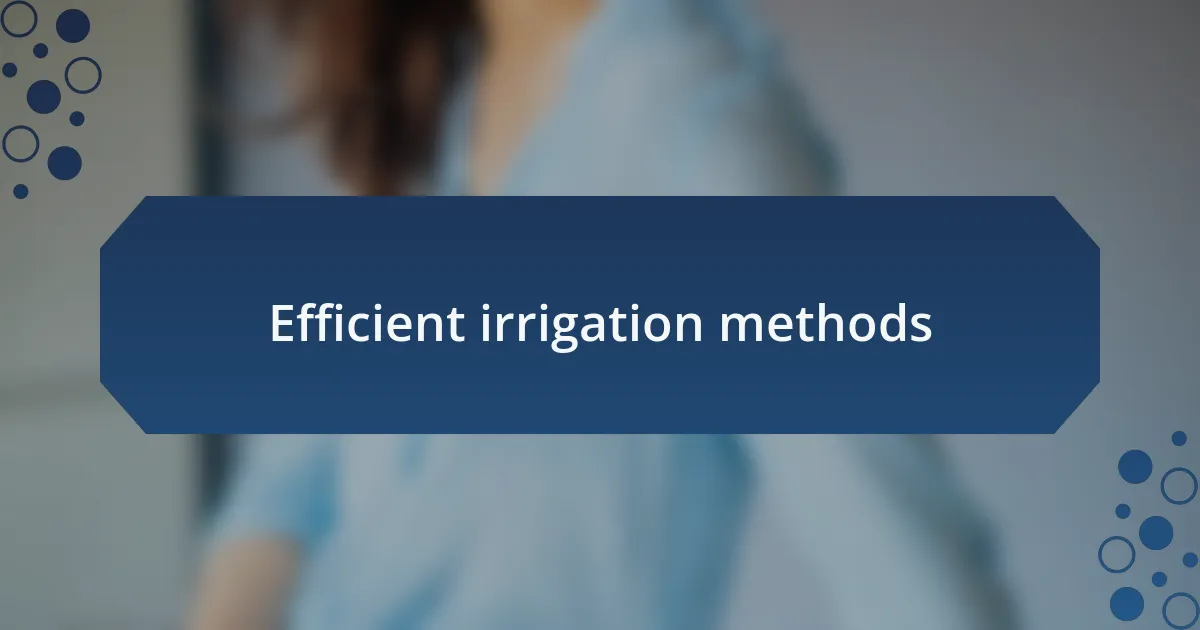
Efficient irrigation methods
Efficient irrigation methods are key to achieving sustainable grape cultivation. I fondly remember installing a drip irrigation system in my vineyard; it was a game changer. Unlike traditional methods, drip irrigation delivers water directly to the root zone, minimizing waste. Have you ever noticed how a little precision can lead to big results?
Another method I’ve explored is the use of soil moisture sensors. These devices help me monitor the water level in the soil, ensuring that I only irrigate when necessary. I can vividly recall a season when I relied solely on these sensors. The grapevines thrived, and my water consumption was down significantly. Isn’t it incredible how technology can enhance organic practices?
Lastly, I’ve found that scheduling irrigation early in the morning or late in the evening can greatly reduce evaporation losses. It took some trial and error to perfect my timing, but the rewards were worth it. I still remember the excitement of seeing my water savings reflected in both my vineyard’s health and my utility bill. When was the last time you considered how small adjustments can lead to lasting change?
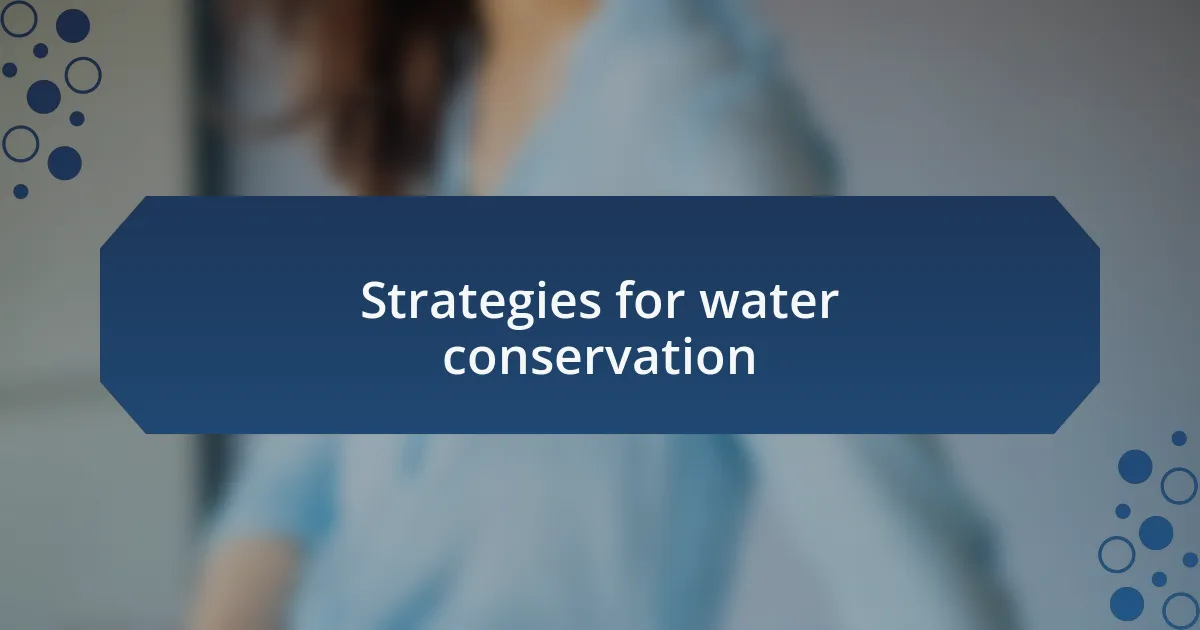
Strategies for water conservation
One strategy that has proven effective for me is mulching around the grapevines. I remember the first time I applied a thick layer of organic mulch – not only did it help retain soil moisture, but it also suppressed weeds. Have you ever felt the relief of knowing you’re doing right by the earth while boosting your vineyard’s resilience?
Another great approach I’ve taken involves planting cover crops. I was initially skeptical when someone suggested it, but seeing the transformation in the soil structure and moisture retention was eye-opening. These crops not only reduce erosion but also improve the soil’s ability to hold water. Isn’t it fascinating how nurturing the soil can lead to healthier vines?
Lastly, implementing rainwater harvesting systems has changed the game for my vineyard. Catching rainwater in barrels might seem simple, but this practice has provided a backup irrigation source during dry spells. Last summer, during an unexpected drought, this practice was invaluable, ensuring my grapevines stayed hydrated. Have you considered how these small changes can lead to significant water conservation?
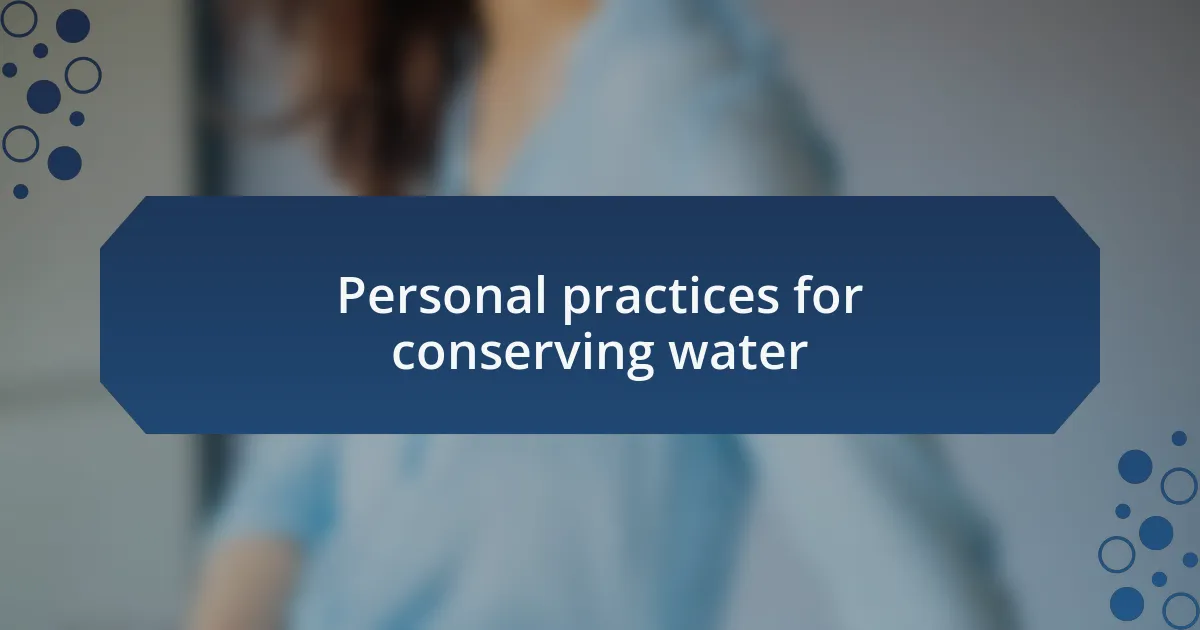
Personal practices for conserving water
Water conservation is vital for anyone involved in organic wine production. One personal practice I swear by is adjusting my irrigation schedule based on weather patterns. I often find myself checking the forecast and delaying irrigation before expected rain. It’s beautiful how nature can sometimes take care of us if we simply adjust our practices accordingly. Have you ever felt that connection to the land and its rhythms?
Another method I’ve embraced is using drip irrigation systems. I remember the first time I installed this setup; I was amazed at how efficiently it delivered water directly to the roots. It feels rewarding to know that I’m reducing water waste significantly. Don’t you think it’s powerful when technology aligns with our eco-friendly values?
Additionally, I’ve taken to regularly checking for leaks in my irrigation system. One morning, I discovered a small leak that had been running undetected for weeks. The realization made my heart sink, but fixing it was a wake-up call about how even minor issues can lead to significant water loss. How often do we overlook these little details that could make a big difference?